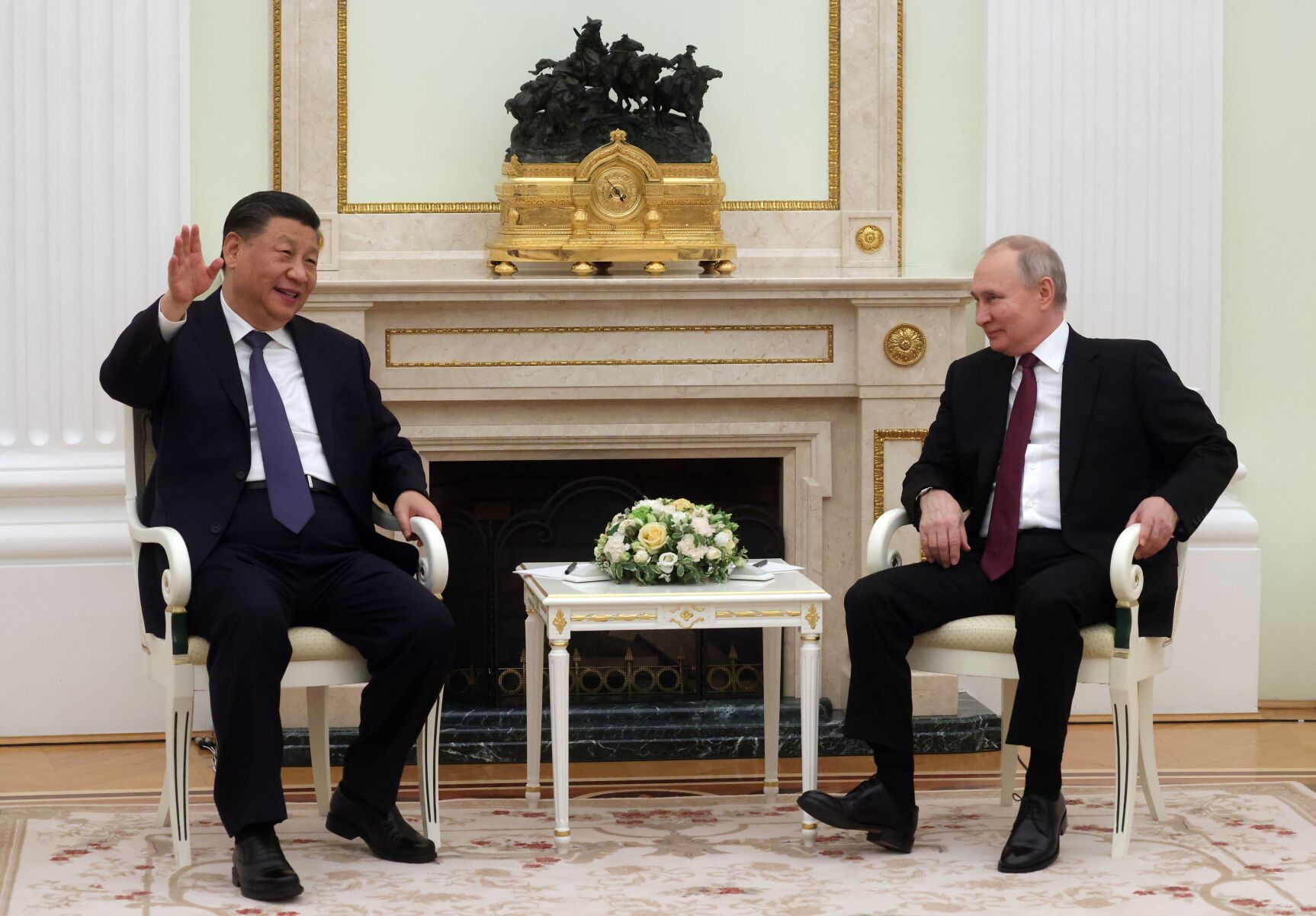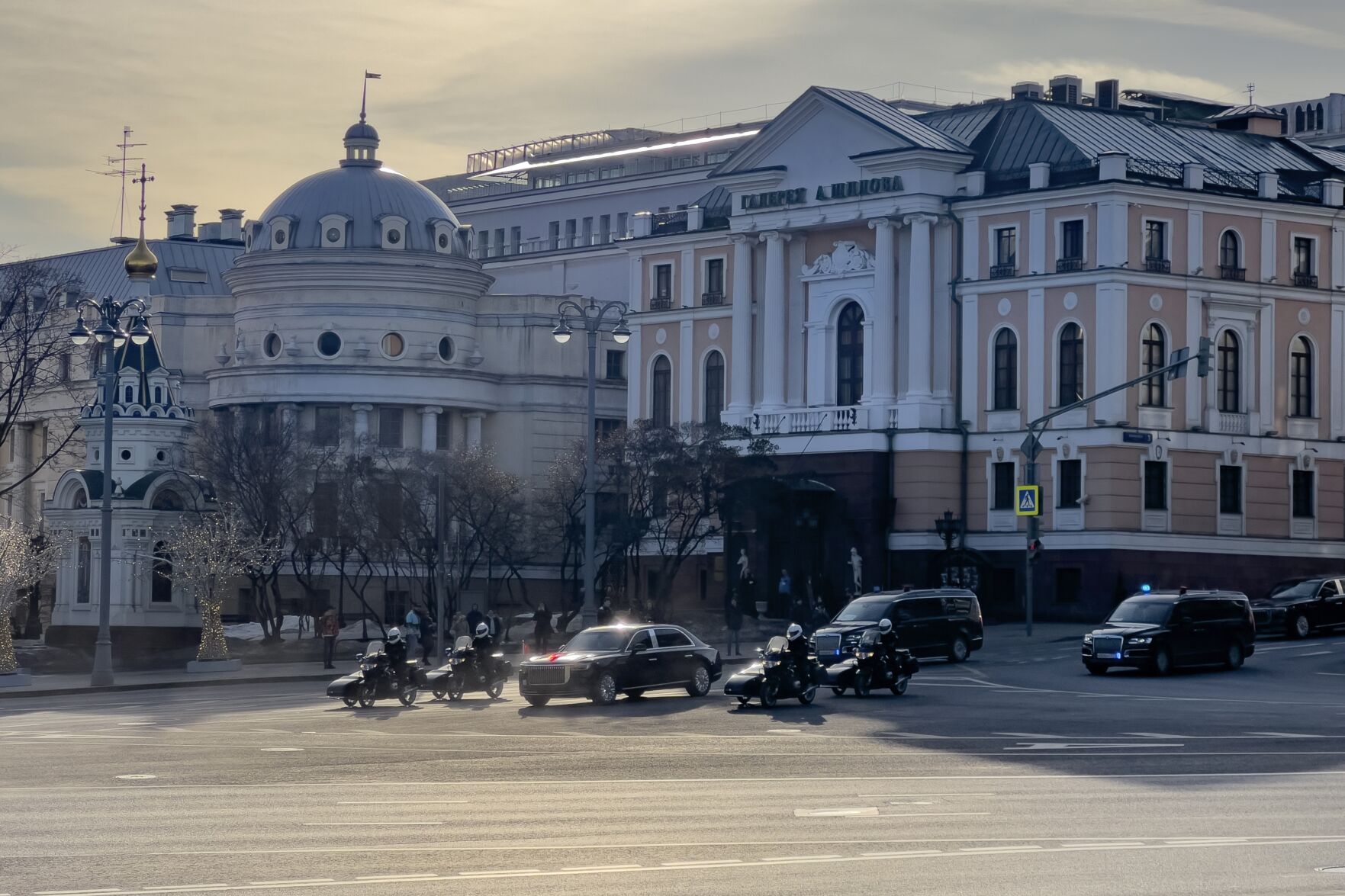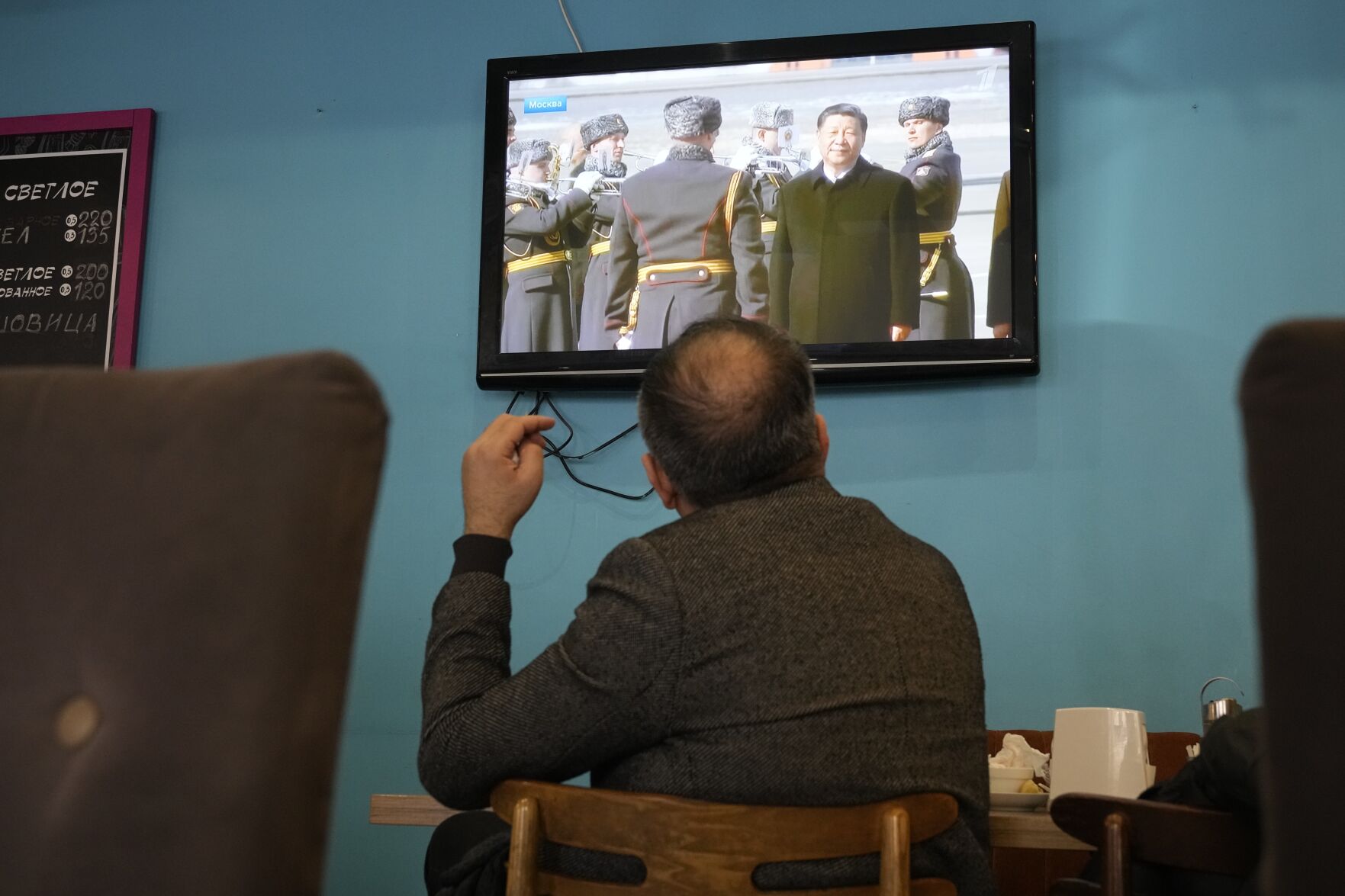MOSCOW — Russian President Vladimir Putin warmly welcomed Chinese leader Xi Jinping to the Kremlin on Monday, sending a powerful message to Western leaders that their efforts to isolate Moscow over the fighting in Ukraine have fallen short.

Sergei Karpukhin, Sputnik via AP
Chinese President Xi Jinping speaks with Russian President Vladimir Putin during their meeting at the Kremlin on Monday in Moscow.
Xi’s trip — his first abroad since his re-election earlier this month — showed off Beijing’s new diplomatic swagger and gave a political lift to Putin just days after an international arrest warrant was issued for the Kremlin leader on war crimes charges related to Ukraine.
The two major powers have described Xi’s three-day trip as an opportunity to deepen their “no-limits friendship.” China looks to Russia as a source of oil and gas for its energy-hungry economy, and as a partner in standing up to what both see as U.S. aggression, domination of global affairs and unfair punishment for their human rights records.
The two countries, among the five U.N. Security Council’s permanent members, also have held joint military drills. U.S. officials have picked up indications China is considering supplying Russia with weapons for its fight in Ukraine but have seen no evidence they’ve actually done so.

Associated Press
Chinese President Xi Jinping's motorcade drives toward the Kremlin on Monday in Moscow.
The leaders smiled and shook hands before sitting down at the start of their meeting, calling each other “dear friend” and exchanging compliments. Putin congratulated Xi on his re-election and voiced hope for building even stronger ties.
“China has made a colossal leap ahead in its development in recent years,” Putin said, adding that “it’s causing genuine interest all around the world, and we even feel a bit envious,” as Xi smiled.
The Kremlin leader welcomed China’s proposals for a political settlement in Ukraine and noted Russia is open for talks.
“We will discuss all those issues, including your initiative that we highly respect,” Putin said. “Our cooperation in the international arena undoubtedly helps strengthen the basic principles of the global order and multipolarity.”
Both Moscow and Beijing have accused Washington of trying to isolate them and hold back their development as they challenge it for regional and global leadership.
In an increasingly multipolar world, the U.S. and its allies have been unable to build a broad front against Putin. While 141 countries condemned Moscow in a United Nations vote marking the first anniversary of Russian troops rolling into Ukraine, several members of the G-20 — including India, China and South Africa — abstained. Many African nations also have refrained from openly criticizing Russia.

Associated Press
A TV screen displays Chinese President Xi Jinping attending an official welcome ceremony upon his arrival at the Vnukovo-2 government airport outside Moscow, in a cafe Monday in St. Petersburg.
“We hope that the strategic partnership between China and Russia will on the one hand uphold international fairness and justice, and on the other hand promote the common prosperity and development of our countries,” Xi said.
In their 4 ½ hours of talks, along with a dinner that included a Pacific seafood platter and roast venison in cherry sauce, Putin would offer Xi a “detailed explanation” of Moscow’s actions in Ukraine, according to Kremlin spokesman Dmitry Peskov. Broader talks on a range of subjects are scheduled Tuesday.
For Putin, Xi’s presence is a prestigious, diplomatic boost to show partnership in the face of Western efforts to isolate Russia over Ukraine.
In an article published in the Chinese People’s Daily newspaper, Putin described Xi’s visit as a “landmark event” that “reaffirms the special nature of the Russia-China partnership” and said the meeting signaled that the two countries aren’t prepared to accept attempts to weaken them.
“The U.S. policy of simultaneously deterring Russia and China, as well as all those who do not bend to the American diktat, is getting ever fiercer and more aggressive,” he wrote.
China portrays Xi’s visit as part of normal diplomatic exchanges and has offered little detail about its purpose, though Foreign Ministry spokesperson Wang Wenbin told reporters Monday that China “will uphold its objective and fair position on the Ukrainian crisis and play a constructive role in promoting peace talks.” Xi didn’t directly mention the Ukraine fighting or his peace plan when he sat down for the talks with Putin.
Beijing’s leap into Ukraine issues follows its recent success in brokering talks between Iran and its chief Middle Eastern rival, Saudi Arabia, which agreed to restore their diplomatic ties after years of tensions.
Following that success, Xi called for China to play a bigger role in managing global affairs.
Although they boast of a “no-limits” partnership, Beijing has conducted a China First policy. It has refrained from supplying Russia’s military — a move that could worsen relations with Washington and turn important European trade partners against China. On the other hand, it has refused to condemn Moscow’s aggression and criticized Western sanctions against Moscow, while accusing NATO and the United States of provoking Putin’s military action.
White House National Security Council spokesman John Kirby urged Xi “to press President Putin directly on the need to respect Ukraine’s sovereignty and territorial integrity.” He also said the U.S. administration believes Xi could play “a constructive role” by speaking directly with Zelenskyy.
The Kremlin has welcomed China’s peace plan, while U.S. Secretary of State Antony Blinken said Monday any proposal that left Russian forces in place in Ukraine would merely let Moscow reequip and otherwise regain strength to resume its offensive.
“Calling for a cease-fire that does not include the removal of Russian forces from Ukrainian territory would effectively be supporting the ratification of Russian conquest,” he told reporters in Washington. “The world should not be fooled by any tactical move by Russia, supported by China or any other country, to freeze the war on its own terms.”
-
China says suspected spy balloon spotted over US is for research, accidently strayed
Xinhua
June 15, 1953: Born in Beijing, the son of Xi Zhongxun, a senior Communist Party official and former guerrilla commander in the civil war that brought the communists to power in 1949.
1969-75: At the age of 15, Xi is among many educated urban youths sent to live and work in poor rural villages during the Cultural Revolution, a period of social upheaval launched by then-leader Mao Zedong.
1975-79: Returns to Beijing to study chemical engineering at prestigious Tsinghua University.
1979-82: Joins military as aide in Central Military Commission and Defense Ministry.
Xinhua
June 15, 1953: Born in Beijing, the son of Xi Zhongxun, a senior Communist Party official and former guerrilla commander in the civil war that brought the communists to power in 1949.
1969-75: At the age of 15, Xi is among many educated urban youths sent to live and work in poor rural villages during the Cultural Revolution, a period of social upheaval launched by then-leader Mao Zedong.
1975-79: Returns to Beijing to study chemical engineering at prestigious Tsinghua University.
1979-82: Joins military as aide in Central Military Commission and Defense Ministry.
-
China says suspected spy balloon spotted over US is for research, accidently strayed
SUB
1982-85: Assigned as deputy and then leader of the Communist Party in Zhengding county, south of Beijing in Hebei province.
1985: Begins 17-year stint in coastal Fujian province, a manufacturing hub, as vice mayor of the city of Xiamen.
1987: Marries Peng Liyuan, a popular singer in the People’s Liberation Army’s song and dance troupe. They have one daughter. An earlier marriage for Xi fell apart after three years.
2000-2002: Governor of Fujian province.
2002: Transferred to neighboring Zhejiang province, where he is appointed party chief, a post that outranks governor in the Chinese system.
March 2007: Appointed party chief of Shanghai but stays only a few months.
October 2007: Joins national leadership as one of nine members of the Politburo Standing Committee, the top leadership of the Communist Party.
March 2008: Named vice president of China.
August 2011: Xi hosts then-Vice President Joe Biden on the latter's visit to China, nearly a decade before Biden becomes U.S. president.
SUB
1982-85: Assigned as deputy and then leader of the Communist Party in Zhengding county, south of Beijing in Hebei province.
1985: Begins 17-year stint in coastal Fujian province, a manufacturing hub, as vice mayor of the city of Xiamen.
1987: Marries Peng Liyuan, a popular singer in the People’s Liberation Army’s song and dance troupe. They have one daughter. An earlier marriage for Xi fell apart after three years.
2000-2002: Governor of Fujian province.
2002: Transferred to neighboring Zhejiang province, where he is appointed party chief, a post that outranks governor in the Chinese system.
March 2007: Appointed party chief of Shanghai but stays only a few months.
October 2007: Joins national leadership as one of nine members of the Politburo Standing Committee, the top leadership of the Communist Party.
March 2008: Named vice president of China.
August 2011: Xi hosts then-Vice President Joe Biden on the latter's visit to China, nearly a decade before Biden becomes U.S. president.
-
-
China says suspected spy balloon spotted over US is for research, accidently strayed
STR
November 2012: Replaces Chinese President Hu Jintao as general secretary of the Communist Party, the top party position.
March 2013: Starts first five-year term as president of China.
2013-2014: China begins reclaiming land in the South China Sea to build islands, some with runways and other infrastructure, pushing its territorial claims to disputed areas in the vital waterway.
2017: China launches a harsh crackdown on the Uyghur and other predominantly Muslim ethnic groups in the Xinjiang region after extremist attacks. Mass detentions and human rights abuses draw international condemnation and accusations of genocide.
October 2017: The party enshrines his ideology, known as “Xi Jinping Thought," in its constitution as he starts a second five-year term as leader. This symbolically elevates him to Mao's level as a leader whose ideology is identified by his name.
March 2018: China's legislature abolishes a two-term limit on the presidency, signaling Xi's desire to stay in power for more than 10 years.
July 2018: The United States, under President Donald Trump, imposes tariffs on Chinese imports, starting a trade war. China retaliates with tariffs on U.S. goods.
June-November 2019: Massive protests demanding greater democracy paralyze Hong Kong. Xi's government responds by imposing a national security law in mid-2020 that quashes dissent in the city.
January 2020: China locks down the city of Wuhan as a new virus sparks what will become the COVID-19 pandemic.
September 2020: Xi announces in a video speech to the U.N. General Assembly that China aims to peak carbon dioxide emissions before 2030 and achieve carbon neutrality before 2060.
December 2020: Authorities announce an anti-monopoly investigation into e-commerce giant Alibaba, the start of a crackdown on China's high-flying tech companies.
August 2022: China launches missiles and deploys warships and fighter jets in major military exercises around Taiwan following the visit of a senior U.S. lawmaker, House Speaker Nancy Pelosi, to the self-governing island that China claims as its territory.
October 2022: Xi starts a third five-year term as Communist Party leader, breaking with recent precedent that limited leaders to two terms.
STR
November 2012: Replaces Chinese President Hu Jintao as general secretary of the Communist Party, the top party position.
March 2013: Starts first five-year term as president of China.
2013-2014: China begins reclaiming land in the South China Sea to build islands, some with runways and other infrastructure, pushing its territorial claims to disputed areas in the vital waterway.
2017: China launches a harsh crackdown on the Uyghur and other predominantly Muslim ethnic groups in the Xinjiang region after extremist attacks. Mass detentions and human rights abuses draw international condemnation and accusations of genocide.
October 2017: The party enshrines his ideology, known as “Xi Jinping Thought," in its constitution as he starts a second five-year term as leader. This symbolically elevates him to Mao's level as a leader whose ideology is identified by his name.
March 2018: China's legislature abolishes a two-term limit on the presidency, signaling Xi's desire to stay in power for more than 10 years.
July 2018: The United States, under President Donald Trump, imposes tariffs on Chinese imports, starting a trade war. China retaliates with tariffs on U.S. goods.
June-November 2019: Massive protests demanding greater democracy paralyze Hong Kong. Xi's government responds by imposing a national security law in mid-2020 that quashes dissent in the city.
January 2020: China locks down the city of Wuhan as a new virus sparks what will become the COVID-19 pandemic.
September 2020: Xi announces in a video speech to the U.N. General Assembly that China aims to peak carbon dioxide emissions before 2030 and achieve carbon neutrality before 2060.
December 2020: Authorities announce an anti-monopoly investigation into e-commerce giant Alibaba, the start of a crackdown on China's high-flying tech companies.
August 2022: China launches missiles and deploys warships and fighter jets in major military exercises around Taiwan following the visit of a senior U.S. lawmaker, House Speaker Nancy Pelosi, to the self-governing island that China claims as its territory.
October 2022: Xi starts a third five-year term as Communist Party leader, breaking with recent precedent that limited leaders to two terms.



